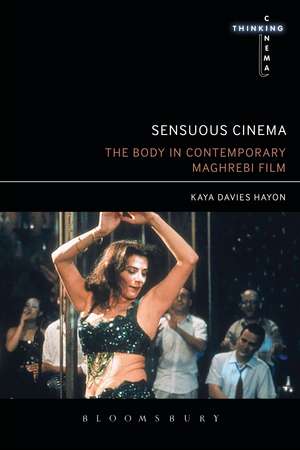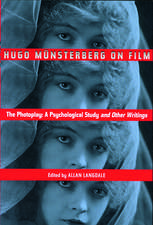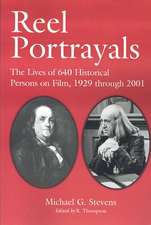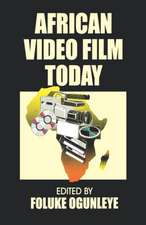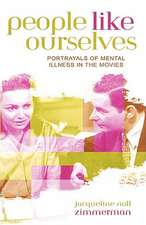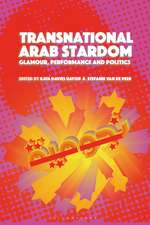Sensuous Cinema: The Body in Contemporary Maghrebi Film: Thinking Cinema
Autor Dr Kaya Davies Hayonen Limba Engleză Hardback – 8 aug 2018
| Toate formatele și edițiile | Preț | Express |
|---|---|---|
| Paperback (1) | 222.55 lei 6-8 săpt. | |
| Bloomsbury Publishing – 19 feb 2020 | 222.55 lei 6-8 săpt. | |
| Hardback (1) | 713.61 lei 6-8 săpt. | |
| Bloomsbury Publishing – 8 aug 2018 | 713.61 lei 6-8 săpt. |
Preț: 713.61 lei
Preț vechi: 1027.15 lei
-31% Nou
Puncte Express: 1070
Preț estimativ în valută:
136.55€ • 146.02$ • 113.85£
136.55€ • 146.02$ • 113.85£
Carte tipărită la comandă
Livrare economică 17 aprilie-01 mai
Preluare comenzi: 021 569.72.76
Specificații
ISBN-13: 9781501335983
ISBN-10: 1501335987
Pagini: 192
Ilustrații: 6 bw illus
Dimensiuni: 152 x 229 mm
Greutate: 0.43 kg
Editura: Bloomsbury Publishing
Colecția Bloomsbury Academic
Seria Thinking Cinema
Locul publicării:New York, United States
ISBN-10: 1501335987
Pagini: 192
Ilustrații: 6 bw illus
Dimensiuni: 152 x 229 mm
Greutate: 0.43 kg
Editura: Bloomsbury Publishing
Colecția Bloomsbury Academic
Seria Thinking Cinema
Locul publicării:New York, United States
Caracteristici
Offers original textual and philosophical analyses of well-known films, such as Exils/Exiles (Gatlif 2004) and La Graine et le mulet/Couscous (Kechiche 2007), as well as more recent films that have yet to receive any critical attention, including Amours voilées/Veiled Love (Samly 2008), Millefeuille (Bouzid 2012) and L'Armée du salut/Salvation Army (Taïa 2014)
Notă biografică
Kaya Davies Hayon is an Assistant Professor in French and Francophone Studies in the Department of Modern Languages at the University of Nottingham, UK.
Cuprins
1. Introduction2. The Corporeality of Exile in Contemporary Maghrebi-French Filmmaking3. Dance, Performance and the Moving Body 4. Embodying Islam: Women in Maghrebi Cinema5. Queer Desires in(-between) the Maghreb and France6. ConclusionFilmographyBibliographyIndex
Recenzii
The strength of the book lies in the descriptions of scenes that the author picks to portray sensuality ... the book will be of interest to those who wish to learn about the tensions that arise in portrayals of religiosity in films coming from Maghreb and its diaspora. It serves as an opening to a more comprehensive study of sensuality in Maghrebi cinema, including the corpus not available with French or English subtitles.
Kaya Davies Hayon offers a compelling and nuanced reading of contemporary Maghrebi films focusing on corporeal desire as they challenge the sociopolitical and cultural normative practices of Maghrebi societies.
Sensuous Cinema is an original, thoughtful account of the role of the body and 'embodied subjectivities' in contemporary Maghrebi and Maghrebi-French filmmaking. Davies Hayon productively draws on a range of critical traditions, such as the cinematic haptic, phenomenology, queer theory, and Western and Muslim feminism to offer a careful and sensitive analysis of a number of under-examined works. This book is a valuable contribution to the study of recent North African filmmakers and filmmaking practices, and will be of interest to scholars and students of film studies, French and Francophone visual culture, postcolonial studies, and gender and sexuality.
Sensuous Cinema provides novel insight into corporeality as a defining concern of recent films about characters of Maghrebi heritage, and unearths fascinating connections between conceptions of embodied subjectivity from different regions of the world. In these ways, this carefully researched and astutely argued book makes a distinctive and powerful contribution to the contemporary debate over how films explore the significance of bodies.
Kaya Davies Hayon offers a compelling and nuanced reading of contemporary Maghrebi films focusing on corporeal desire as they challenge the sociopolitical and cultural normative practices of Maghrebi societies.
Sensuous Cinema is an original, thoughtful account of the role of the body and 'embodied subjectivities' in contemporary Maghrebi and Maghrebi-French filmmaking. Davies Hayon productively draws on a range of critical traditions, such as the cinematic haptic, phenomenology, queer theory, and Western and Muslim feminism to offer a careful and sensitive analysis of a number of under-examined works. This book is a valuable contribution to the study of recent North African filmmakers and filmmaking practices, and will be of interest to scholars and students of film studies, French and Francophone visual culture, postcolonial studies, and gender and sexuality.
Sensuous Cinema provides novel insight into corporeality as a defining concern of recent films about characters of Maghrebi heritage, and unearths fascinating connections between conceptions of embodied subjectivity from different regions of the world. In these ways, this carefully researched and astutely argued book makes a distinctive and powerful contribution to the contemporary debate over how films explore the significance of bodies.
